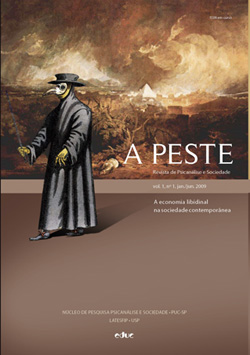Narrativa do destino e a função identitária do corpo na modernidade
DOI:
https://doi.org/10.5546/peste.v1i1.2708Resumo
Resumo: A partir da dissolução moderna das metas-narrativas, avançamos a hipótese que dois de seus efeitos seriam, primeiramente, a fragilidade da modalidade narrativa do destino e, em seguida, a função identitária que a corporeidade parece ter tomado em nossa cultura. Para isso, colocamos em relação o declínio das visões totalizantes do mundo, ou como diria Freud a dissolução das Weltanschauungen ao nível da cultura, e aquele da narração do destino ao nível do indivíduo. Posteriormente, as relações entre a extinção progressiva da narração do destino e a tomada do corpo enquanto suporte imagético da identidade são problematizadas com base no conceito de “identidade narrativa” de Paul Ricoeur. Palavras-chave: modernidade; identidade; narração; corpo; alteridade. Abstract: We hypothesize that two indirect effects of the modern dissolution of the meta-narratives would be, firstly, the fragility of the narrative of “fate” and, secondly, the identitary function that the body appears to have assumed in our culture. We argue that the decline of totalizing views of the world, or as Freud would say, the dissolution of Weltanschauungen, corresponds, in the level of culture, to what the narration of fate represents in the level of the individual. Then, the relations between the gradual extinction of the narration of fate and the use of the body as an image support for identity are investigated based on Paul Ricoeur’s concept of “narrative identity”. Keywords: modernity; identity; narration; body; otherness.Métricas
Carregando Métricas ...
Downloads
Como Citar
Silva Junior, N., Doucet, C., Gaspard, J.-L., Carvalho, S. M. de, & Gomes, L. G. N. (2010). Narrativa do destino e a função identitária do corpo na modernidade. A PESTE: Revista De Psicanálise E Sociedade E Filosofia., 1(1). https://doi.org/10.5546/peste.v1i1.2708
Edição
Seção
Artigos

